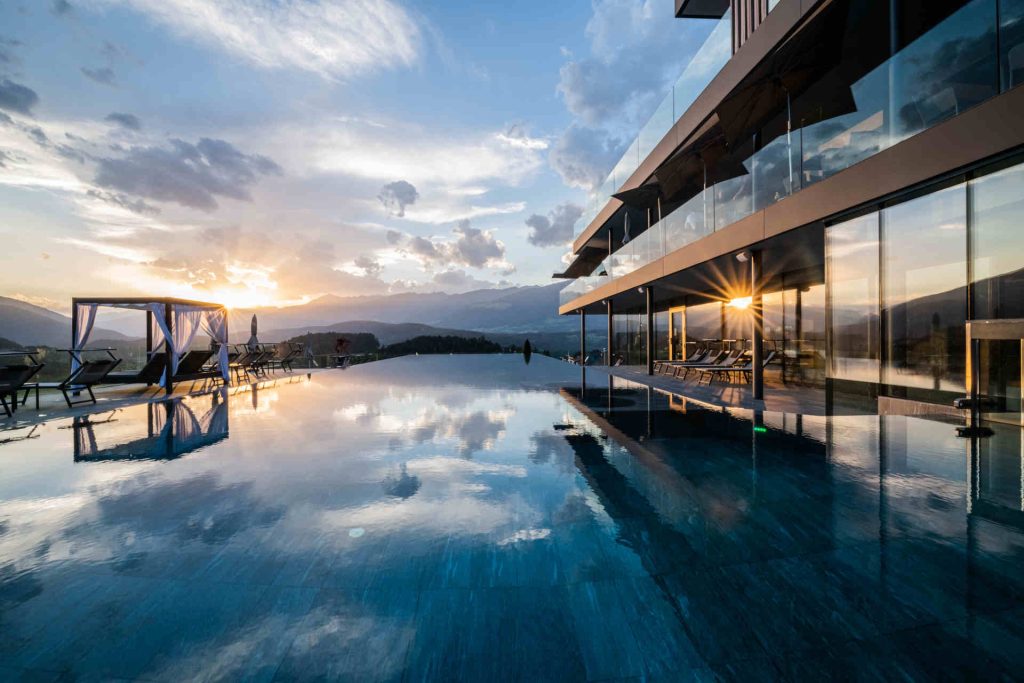
From breathtaking views to innovative design – these spectacular pool concepts in the Alps show how hotels can score points with experience value and offer their guests deep relaxation with distant views.
In an industry in which guest experiences are increasingly determining bookings, more and more hotels are focusing on exceptional wellness offers to set themselves apart from the competition. Pools in particular are becoming architectural highlights and marketing stars. Some of the most beautiful examples of this can be found in the Alps - from South Tyrol to Salzburger Land - where luxury, nature experience and design combine to create an all-round convincing offer.
At the Alpin Panorama Hotel Hubertus in Olang (South Tyrol), for example, pleasant thrills merge with relaxation: the Sky Pool floats twelve meters above the ground, with a glass floor and panoramic views of the Dolomites. No less spectacular: the rooftop infinity pool at the Hotel Berghof in St. Johann im Pongau (Salzburger Land). With water heated to 32 °C and a 360° mountain panorama, the adults-only retreat offers an exclusive wellness experience that appeals to discerning couples.
The Hotel Hohenwart in Scena/Schenna (South Tyrol) offers another highlight of Alpine wellness culture: In the rooftop saltwater pool, you can bathe with a panoramic view over the expanse of Merano to the peaks of the Texel Group. The gentle brine carries your body seemingly weightlessly through the water.
For guests who prefer peace and quiet to the wow effect, Chalet Purmontes in Mantana in South Tyrol scores with individuality: each guest enjoys their own heated pool surrounded by natural stone for absolute privacy. The trend towards “private wellness” is opening up new target group potential in the high-end segment.
Hotels such as the Tauern Spa in Zell am See or the Hotel Winkler in St. Lorenzen stage their pools as experience spaces for all seasons. While the view of the Kitzsteinhorn or the South Tyrolean Alps dominates in summer, the winter steam above the outdoor pool becomes a sensual attraction. This shows that a well-planned pool is not seasonal, but creates desire all year round.
The Puradies Naturresort concept in Leogang is particularly focused on sustainability. The heated outdoor infinity pool with indoor access fits seamlessly into a spa landscape that aims to convey holistic well-being with natural materials, a fireplace lounge and natural bathing pond - a response to the growing desire for sustainable relaxation.
These examples offer clear lessons for hotel operators: pools have long been more than just wellness add-ons - they are brand ambassadors, Instagram backdrops and booking criteria all in one. Those who invest in design, location and quality of experience create emotional anchor points that inspire and retain guests. With a clear target group orientation, year-round usability and visual staging, a pool becomes a USP with charisma.

Whether it’s family suites with a literary touch, fine dining as a performing art, or radio waves from the hotel courtyard – hotels around the world and across the region are focusing on experiences that surprise, connect, and create added value. Here are five examples of how classic offerings can be transformed into extraordinary brand moments.
Art has long been more than just a decorative element; it is increasingly becoming a strategic tool for branding and guest experience. The hospitality sector in particular demonstrates how powerful creative staging can be: it transforms spaces into emotional meeting places, creates identification, and remains in the memory.
Anyone who wants to create atmosphere today has to think beyond colors and shapes and tell stories that touch people. The following article highlights how design and art can be used specifically to not only welcome guests, but also to inspire them in the long term.


From breathtaking views to innovative design – these spectacular pool concepts in the Alps show how hotels can score points with experience value and offer their guests deep relaxation with distant views.